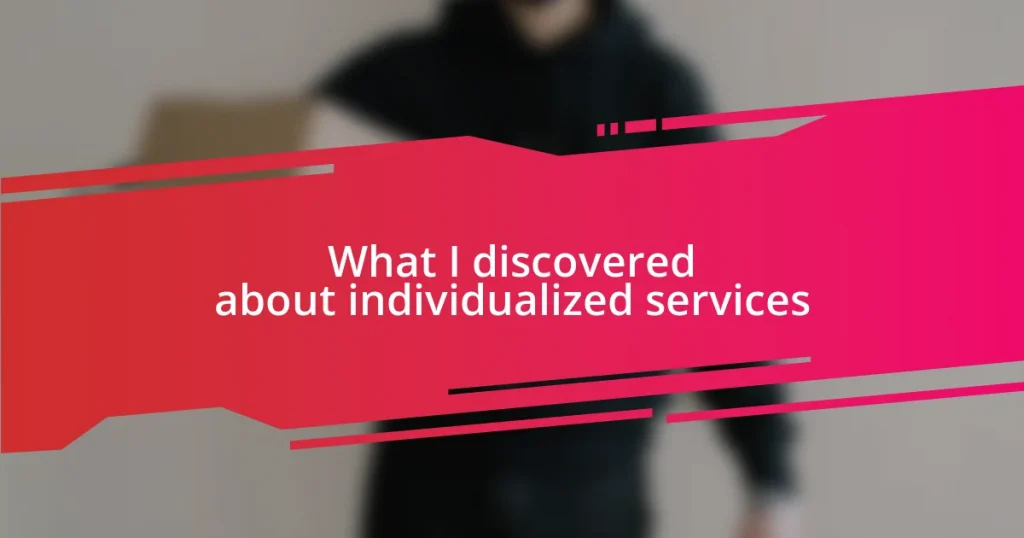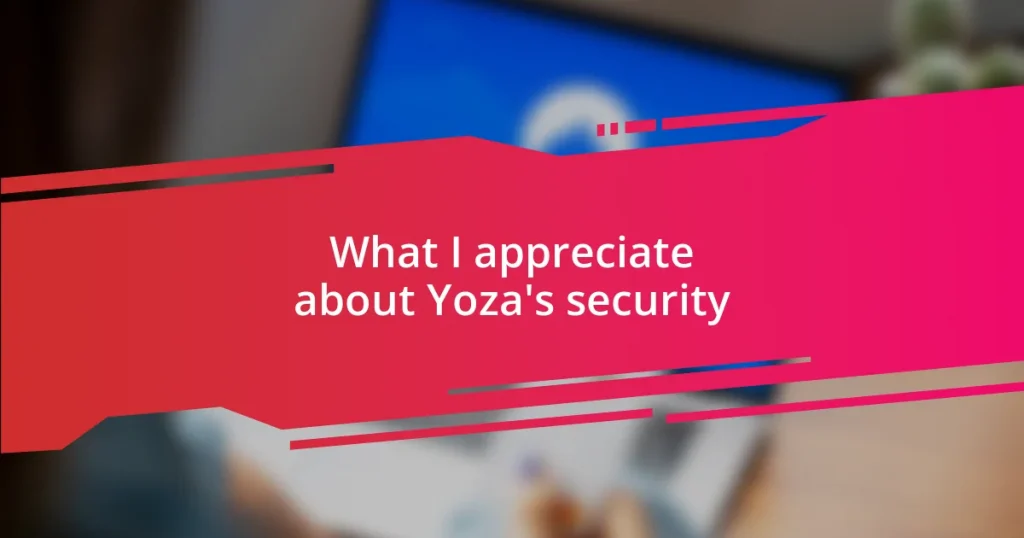Key takeaways:
- Individualized services significantly enhance engagement, satisfaction, and outcomes by recognizing and addressing unique individual needs.
- Key components include active listening, ongoing assessment, and collaboration, fostering a supportive environment for effective service delivery.
- Future trends indicate the rising role of technology, holistic approaches, and continuous feedback in personalizing services and adapting to evolving client needs.
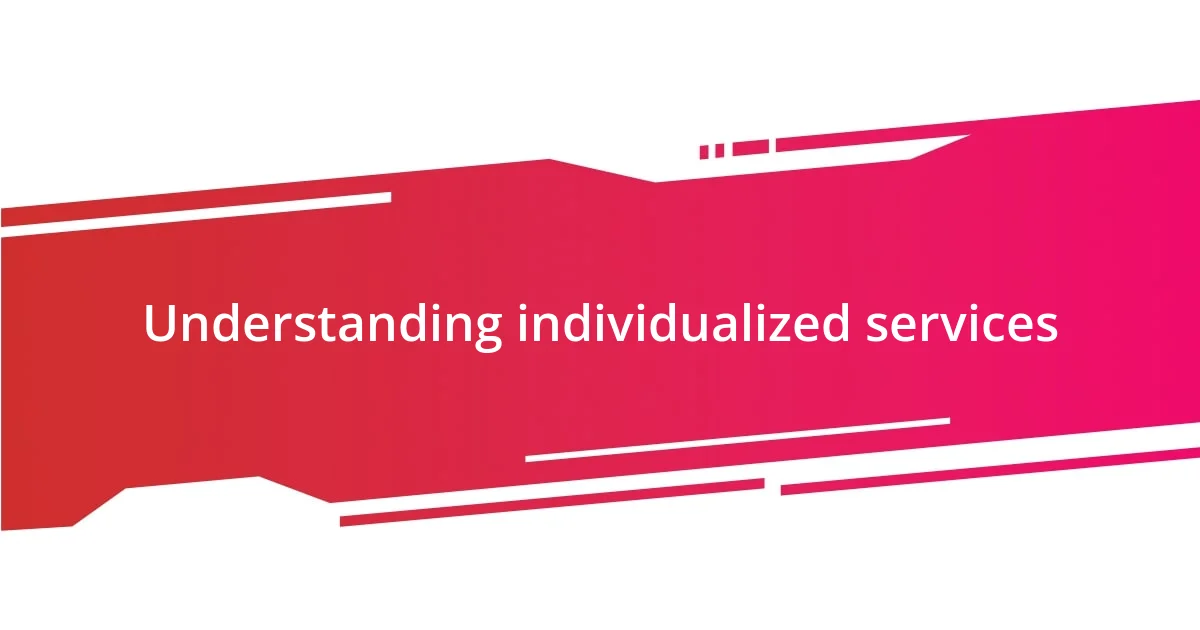
Understanding individualized services
When I first began exploring individualized services, I was amazed by how tailored approaches could transform a person’s experience. Have you ever felt lost in a one-size-fits-all system? I remember a friend who struggled with his learning style until a mentor created a custom plan that sparked his passion for learning. It was eye-opening to witness how understanding unique needs can foster growth and motivation.
Individualized services center around the idea that everyone has distinct requirements that deserve attention. Think about it: doesn’t it make sense that our varying backgrounds and preferences should shape the support we receive? I often reflect on a time when my own preferences were overlooked in a group setting; the impact was disheartening. Customized services, however, create an environment where each voice is heard and valued, which in turn cultivates deeper connections and understanding.
At its core, understanding individualized services means recognizing the significance of personal experiences in crafting effective support. I find that when we take the time to delve into an individual’s story, it not only enhances the service delivered but also builds trust. Have you noticed how much more effective solutions are when they resonate with someone’s personal journey? For me, it’s a reminder that true progress is rooted in empathy and collaboration.
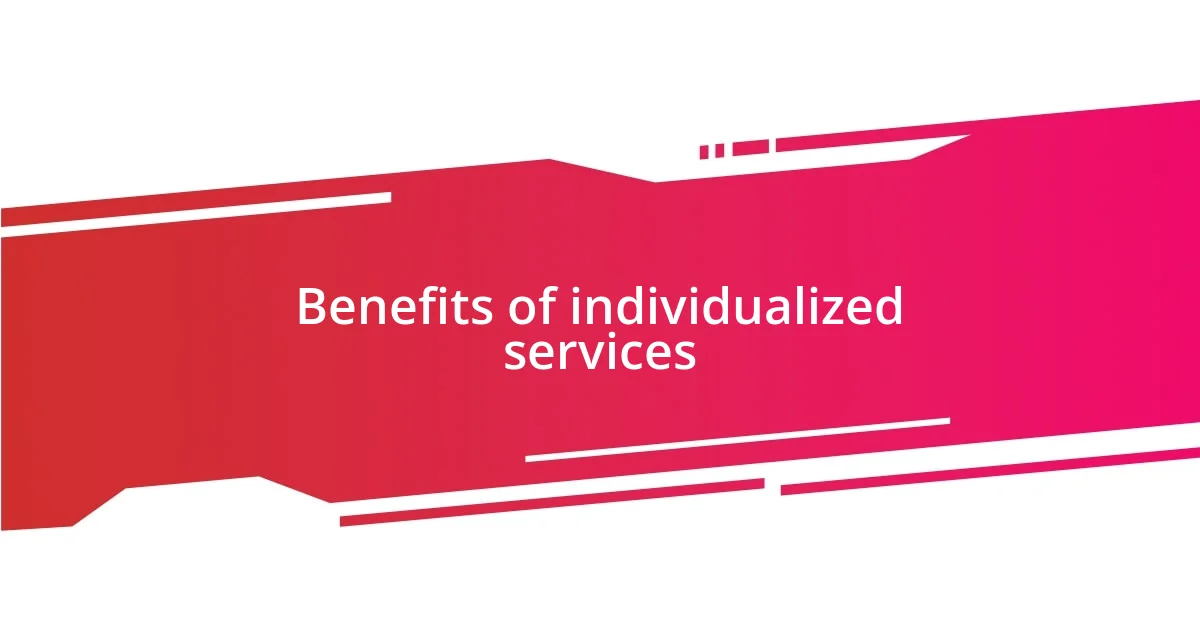
Benefits of individualized services
The benefits of individualized services are profound and far-reaching. I recall a time when a colleague of mine faced significant challenges in her work-life balance. When her supervisor took the time to understand her specific needs and adjusted her workload accordingly, it was as if a weight had been lifted. Personalized attention not only helped her excel but also boosted morale across the entire team. It’s remarkable how simply recognizing someone’s unique challenges can lead to improved outcomes.
Consider these key advantages of individualized services:
- Enhanced Engagement: Tailored approaches encourage individuals to actively participate, leading to deeper connections with the service provided.
- Improved Satisfaction: When people feel that their needs are truly understood, their overall satisfaction tends to soar.
- Better Outcomes: Customized strategies allow for more effective progress, as they align closely with personal values and circumstances.
- Empowerment: Individuals often feel more capable and confident when receiving support that acknowledges their unique strengths and challenges.
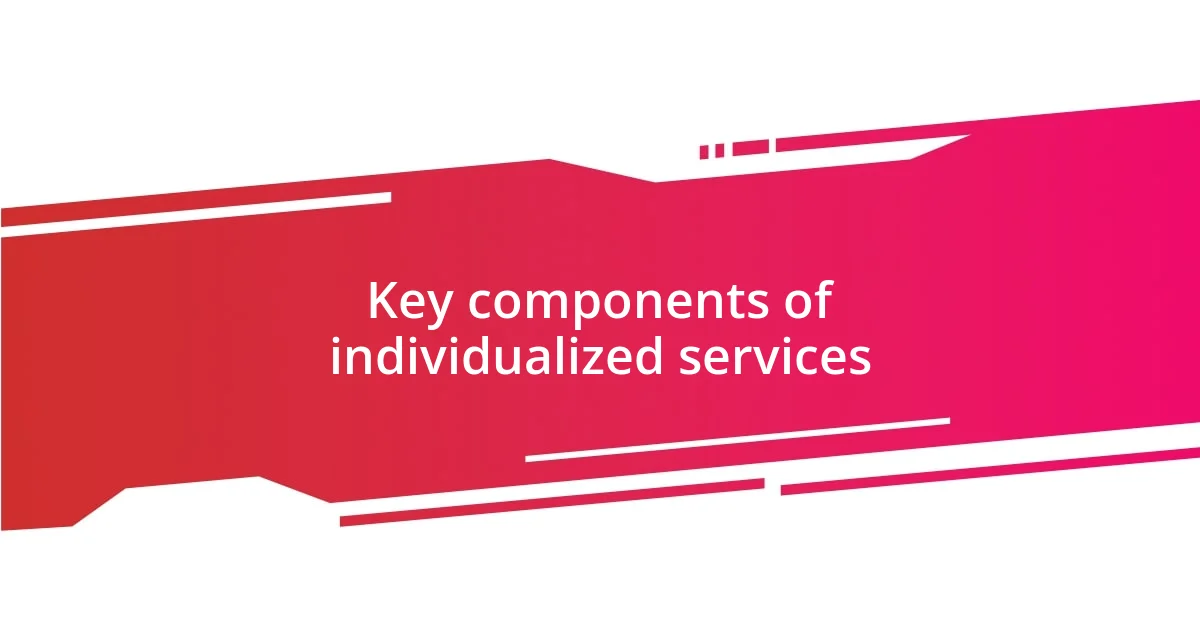
Key components of individualized services
Certainly! Here are the paragraphs regarding the key components of individualized services, along with the requested comparison table in HTML format.
When I reflect on the essential components of individualized services, I cannot help but underscore the importance of active listening. One experience that stands out for me is when I attended a workshop where the facilitator emphasized creating an open dialogue. It shifted the entire atmosphere—participants began sharing their concerns openly. This not only fostered trust but also allowed us to co-create solutions that genuinely addressed our needs. Isn’t it incredible how taking the time to listen can change everything?
Another critical aspect is ongoing assessment. I remember a time volunteering with a group where we continually checked in on each individual’s progress. This wasn’t just about performance metrics; it was about understanding how each member felt and what adjustments were necessary. Regular feedback loops ensured that the services remained relevant and responsive. Have you ever had an experience where you felt unheard? I know I have, and it only highlighted how essential this component is in the provision of effective support.
Finally, collaboration stands out as a key ingredient in individualized services. I think back to a team project that fell flat due to a lack of diverse perspectives. Conversely, when I participated in a different initiative that incorporated collaborative brainstorming, the outcome was spectacular. Each person’s viewpoint was not just welcomed; it was integral to the process. Isn’t it fascinating how working together can illuminate paths that one person alone might overlook?
| Component | Description |
|---|---|
| Active Listening | Creating an environment for open dialogue and trust-building. |
| Ongoing Assessment | Regular check-ins to ensure services adapt to individual needs. |
| Collaboration | Incorporating diverse perspectives for more innovative solutions. |
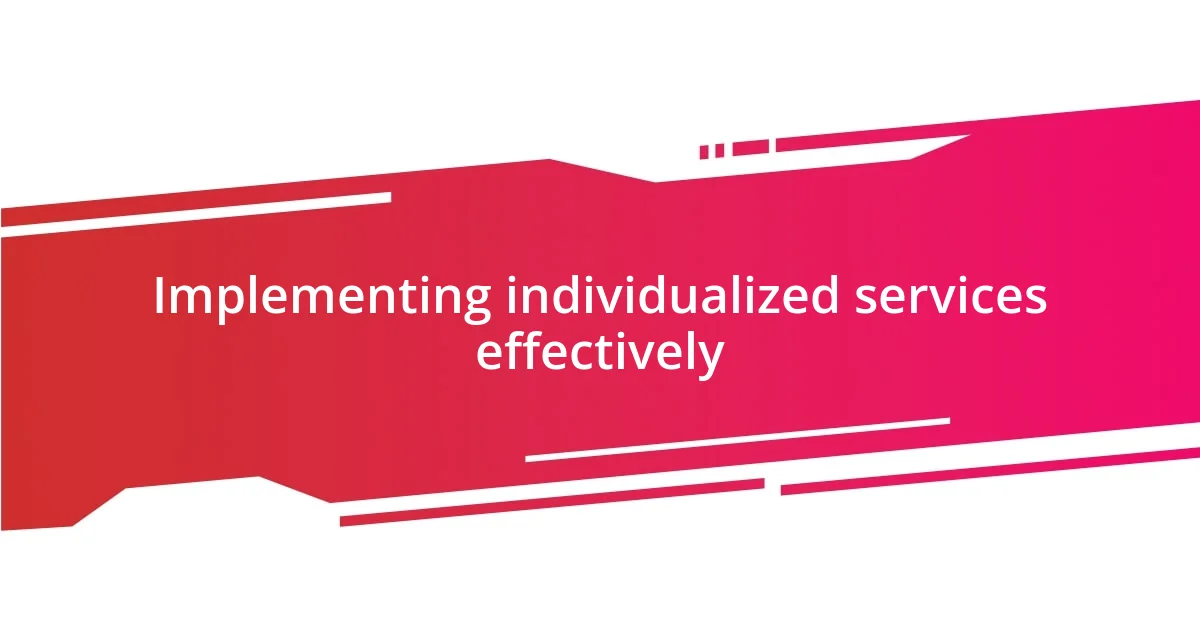
Implementing individualized services effectively
Implementing individualized services effectively hinges on understanding the unique needs of each person involved. I remember working on a project where we aggregated insights from participants through surveys and one-on-one interviews. The result? We could tailor our services, enhancing participation and outcomes. Isn’t it rewarding to see how personalized attention can completely transform someone’s experience?
One technique I found particularly useful is the creation of individual action plans. During my time volunteering, we would sit down with individuals to map out their goals and priorities together. This collaborative approach not only empowered them but also instilled a sense of ownership over their progress. Have you ever felt that spark of motivation when you’re actively involved in shaping your journey? It truly makes all the difference.
Additionally, fostering a culture of recognition plays a pivotal role in sustaining individualized services. I recall a session where we celebrated small successes—like achieving a personal milestone—even when the overarching goals seemed distant. The boost in confidence brought about by recognition became infectious, igniting passion and commitment among participants. Can you imagine how uplifting it is to see someone’s face light up when their efforts are acknowledged? This simple act can create a ripple effect, transforming the entire service experience.
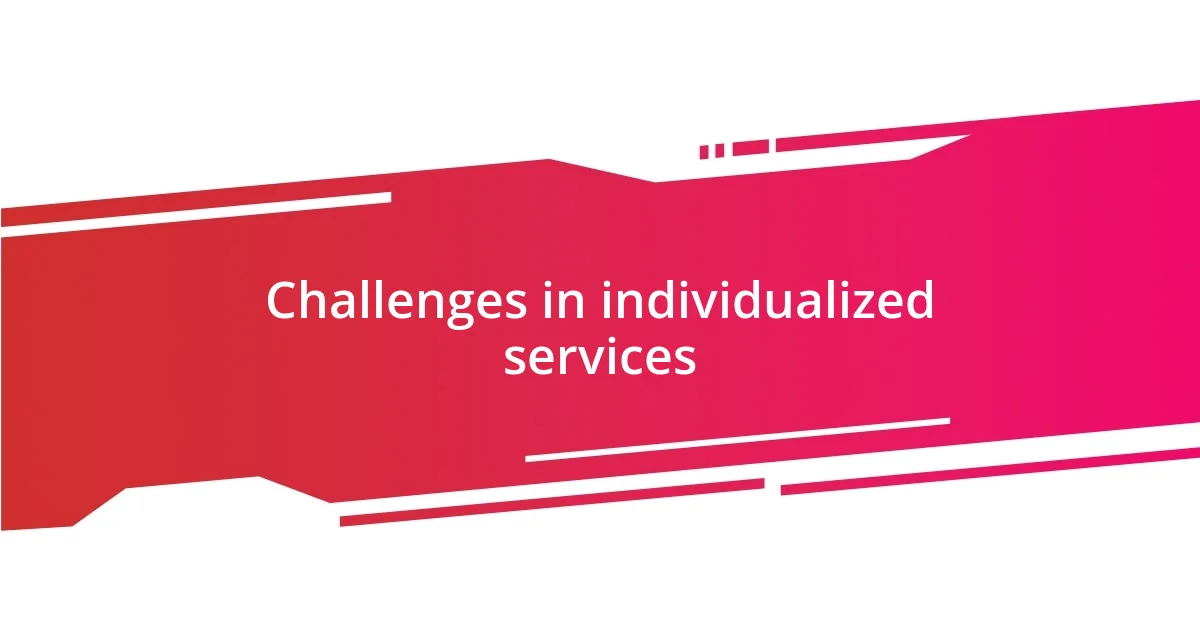
Challenges in individualized services
When it comes to individualized services, one of the most profound challenges I’ve encountered is the balancing act between customization and scalability. In my previous experience, I worked on a project where we aimed to tailor services for a diverse group of clients. While we had great intentions to personalize our support, it quickly became clear that addressing each person’s unique needs often overwhelmed our resources. Isn’t it frustrating when your best efforts feel hindered by logistical constraints? I’ve found that striking that balance is crucial yet often elusive.
Another hurdle I’ve faced is the variability in clients’ responses to personalized services. I remember collaborating with a team that crafted bespoke plans for individuals with varying degrees of engagement. Some clients thrived with this tailored approach, while others felt lost in the details and wanted a more structured framework. It made me realize that not everyone responds well to individualization. Have you ever noticed that what works for one person might not resonate with another? It’s a reminder that flexibility in our approach can be equally important as personalization.
Additionally, securing consistent collaboration among various stakeholders presents its own set of challenges. I recall a situation during a community initiative where communication breakdowns between service providers hindered our progress. What should have been a seamless process turned into a series of misunderstandings, leaving individuals feeling unsupported. How essential it is, then, to cultivate strong relationships and ensure clarity among all parties involved! Without that collective commitment, the effectiveness of individualized services can diminish dramatically.
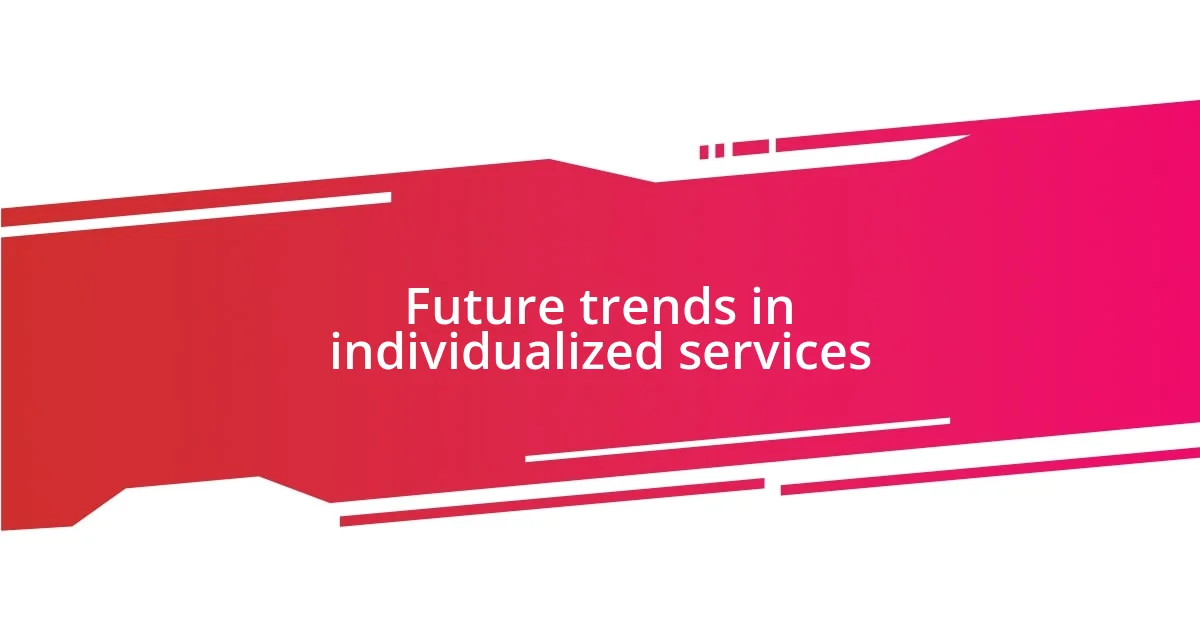
Future trends in individualized services
As I look towards the future of individualized services, one trend that stands out to me is the rise of technology. AI and data analytics are becoming increasingly instrumental in crafting personalized experiences. I recently attended a conference where they demonstrated how algorithms can analyze client preferences in real-time, adapting services to meet their evolving needs. Isn’t it fascinating how technology can enhance our ability to connect with people on a personal level?
Another trend that excites me is the emphasis on holistic approaches. I once participated in a program that integrated mental health support with traditional services. The result was a more balanced and comprehensive experience for individuals. This kind of interconnected service model not only meets various needs but also fosters a deeper sense of well-being. Can you imagine the profound impact this could have on individuals who often feel like they’re juggling multiple services? It’s about time we break down those silos and prioritize complete care.
Additionally, the focus on continuous feedback loops is becoming ever more significant. In my experience, I’ve seen how regular check-ins can really make a difference. I was part of a pilot project where we solicited feedback from participants on a monthly basis, allowing us to tweak services in real time. This responsiveness not only fostered trust, but it also empowered individuals to feel like they were co-creators of their service journey. Isn’t it powerful to think that by listening, we can truly transform lives?










